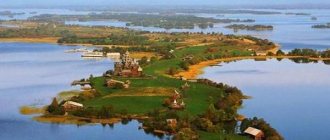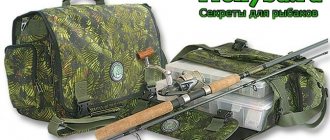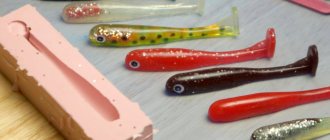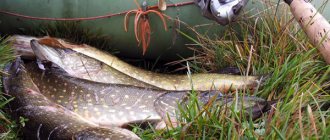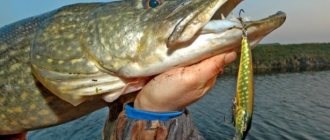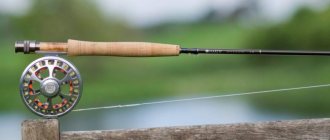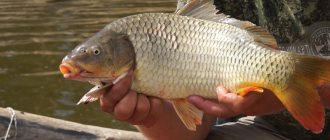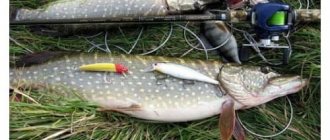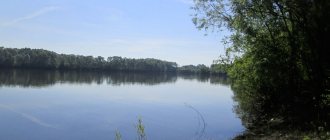Fishing has long been a leader among all other men's hobbies. Therefore, for many of them it is already a way of life. Anglers have their own circle of like-minded people, where they discuss the most interesting and unusual cases of fishing, exchange secrets of successful fishing and give each other equipment.
It’s easy to guess what a fisherman’s house looks like: under his bathroom there are containers designed for storing mealworms, cabinets are filled with equipment and devices for fishing, and the apartment is always filled with the smell of the sea.
Fishermen are not lazy people. They enjoy gatherings near the ice hole in winter and early mornings in summer.
They, like no one else, manage to feel nature in all its manifestations. When you ask an avid fisherman where he will go on vacation, his choice will undoubtedly be some large body of water where the best varieties of fish are found.
So can fishing be called a way of life? Of course! Just like sports, business, a circle of skilled hands and other various kinds of hobbies.
Summer fishing
Summer fishing is significantly different from fishing at any other time of the year. For many fishermen, this is the most difficult period, because many food sources appear in the sea reservoir, and accordingly, the fish become well-fed and picky.
To return home with your catch, you should carefully prepare for fishing and take with you everything you need.
Fishing gear
The choice of gear directly depends on how the fisherman intends to fish.
It could be:
- The most common float rod.
- A special rod designed for fly fishing.
- A more professional fishing rod is a spinning rod.
- Necessary equipment for the selected fishing rod. This could be a fishing line, a reel, hooks, sinkers, spoons, laces, floats and much more.
- Landing net.
- Net.
- A special release designed for unhooking bait, for example, from snags or thickets.
- A container for storing caught fish.
- Fishing rod stand.
- Soft cage.
- Various fishing rod attachments.
You should also not forget about other important things, namely, bait, bait and additional tools.
Bait
It is worth considering: the fish feeds only on fresh prey.
The bait depends on what kind of prey the fisherman wants to get.
There are several of the most popular ones:
- First of all, these are, of course, worms. They can be dung, water and rain. They cannot be stored for long periods of time, so it is recommended to collect them the day before or before fishing.
- Large fish bite on live bait. It is represented by a smaller individual caught in the same reservoir.
- You can use various insects as bait , for example, flies or their larvae.
- Small fish readily bite on maggots or bloodworms. A larger specimen can be caught using a caddisfly or jig.
- You can also use a homemade product , namely bread, flour or corn.
- Some varieties of fish bite on sweet potatoes.
- Most fish feed on their own kind. Therefore, it is recommended to use leeches, frogs or tadpoles as bait.
It is recommended to store bait in tightly closed metal cans. If there are none, then you can use a box.
Lure
Bait is mainly used only when “hunting” for pike. The yawner acts as it. It allows you to open the fish's mouth and safely remove the hook from it.
Tools
Also, you need to take additional tools that may be needed while fishing:
- Shovel. Necessary if you want to dig up worms just before fishing.
- Axe. Surprisingly, as practice has shown, this is the most necessary thing for fishing. You can use it to chop branches or firewood to start a fire.
- To fasten the equipment you will need pliers, wire cutters or a hacksaw.
- Be sure to have a small knife with you.
There are special fishing “suitcases” that contain everything you need for fishing.
Personal items
- The first thing you need to prepare is a container in which you can put all the necessary things. This is a backpack, duffel bag or sports bag. It should be comfortable and made of durable material.
- In summer it is hot outside, so you need to take sun protection with you: cream, glasses and a hat.
- A special thermos bag for bait creates a minimum temperature favorable for worms.
- Comfortable shoes and waterproof clothing.
- Umbrella.
- Insect repellents.
- If you need to stay fishing until late, you should also stock up on a flashlight and matches.
- A chair or stool. A soft, old pillow will also work.
- Towel.
- Water and food.
Clothes for fishing
Clothes can be used either casual or specialized.
You should dress according to the weather. In summer the following will come in handy:
- Tight trousers.
- Shirt.
- Shorts.
- T-shirt.
- Vest.
However, do not forget that the temperature can change dramatically even during the day. Therefore, it is worth taking with you a sweater and a light fishing jacket, which will be good protection from the cold, insects, light rain or drizzle. To protect against rain, you should take a raincoat made of waterproof fabric with you when fishing. A mandatory part of the costume is a headdress to protect from exposure to sunlight.
When choosing shoes, you must be guided, first of all, by the conditions of the area where fishing takes place. When fishing from the shore, you must use light shoes such as sandals or sneakers, and when fishing in shallow water, rubber boots with high tops and waders. A change of shoes will always come in handy.
In the cool season you will need:
- Thermal underwear.
- T-shirts and shirts.
- Overalls.
- Jacket.
- Insulated vest.
- Socks.
- Knitted hat.
- Raincoat.
In winter, it is necessary to use insulated jackets, overalls, trousers made of special material using the “Core-Tex” and “Sympatex” (membrane breathable fabrics) and “Coating” (water-repellent material) technologies, as well as thermal underwear, shirts, jumpers, special woolen socks, knitted hats and gloves. Shoes must reliably protect your feet from severe frosts. Special boots designed for fishing are suitable for this. Typically, manufacturing companies guarantee comfort down to – 50*C.
Winter fishing
Experienced fishermen know that you shouldn’t take anything extra for winter fishing. The bag should be as light as possible. Therefore, strictly only everything that is necessary is taken.
Fishing gear
- A special fishing rod suitable for winter fishing. It should have a special handle that is comfortable to hold with mittens.
- The fishing rod must be equipped with a special device - a whip. It allows you to create the correct vibration amplitude, which will allow you to successfully catch prey from the hole. The type of whip directly depends on what type of fish the fisherman plans to hunt.
- The signal that the fish has “pecked” is transmitted by a special device – a nod. Its main variety lies in length. This parameter depends on the type of fish.
- For winter fishing you need to prepare a special fishing line. Its diameter should be smaller than when fishing in summer. In winter, the fish becomes shy, and the sight of the fishing line can cause it to change its direction.
- A float is also necessary to attract bait.
Bait
- Maggot is long-lived. This profit is being prepared in early autumn. It is necessary to purchase maggot larvae and place them in a cardboard box with holes. This “house” should be stored on the balcony or in the room. It is worth considering that its inhabitants may die if the temperature drops by more than 4 degrees.
- For catching small fish, a jig is most suitable.
- You can also stock up on worms for the winter. You can store them in the cellar. If you need to find “fresh” individuals, you can find them near garbage dumps, landfills and places with waste.
- Butterfly larvae , also called burdock moths. You can also store the dacha dwellers themselves, namely, codling moths or caterpillars.
- In many fishing stores you can see fly larvae. Why buy them if you can create your own “farm” in the summer.
An important rule to remember: fish in winter rush to the aroma. Therefore, the bait needs to be additionally saturated. This can be done using special flavors for fishing.
Lure
- The best bait for winter fishing is a liquid with a smell, sold in a fishing store. It is enough to pour a small amount into the hole and the fish will swim to the smell.
- You can make your own homemade fishing using semolina, breadcrumbs and sunflower seeds.
- There are many more types of baits in fishing stores, ranging from aromatic tubes to ready-made mixtures. When choosing them, you must be extremely careful; the label should contain the inscription “for winter fishing.”
Tools
- Ice ax – necessary to create a hole.
- An ice pick is a device that allows you to determine the thickness of ice.
- A scoop is a device for removing ice from holes.
- Compact box.
Personal items
- Warm clothes. It is best to purchase special winter overalls with a hood.
- Thermal underwear.
- Protective face mask from the effects of frost and wind.
- Several pairs of warm socks and mittens.
- Food and water. It is best to prepare a thermos of warm, slightly sweetened tea in advance.
It is not recommended to drink alcoholic beverages in large quantities during winter fishing.
The worst thing that can happen during winter fishing is frostbite. Therefore, you need to try to move as much as possible, if you have to sit with a fishing rod, then you need to at least stomp your feet and clap your hands.
Fishing tackle and equipment
In order to take everything you need from gear and equipment, first of all, we decide on the gear itself - how and what we will fish with, and the duration of fishing.
You will definitely need:
- The rod itself.
- Coil.
- Fishing line.
- Hooks.
- Lures.
It’s up to everyone to decide whether to take one stick or several, but a spare reel, hooks, fishing line, and a set of baits definitely won’t hurt.
Don’t forget about sinkers, additional spools, feeders, swivels, leashes, tees, bombards, floats, etc.
Will come in handy:
- A cage with a landing net.
- Folding chair.
- Rod stands.
- Pliers, gapper, extractor, wire cutters.
- Hook, fish bag.
- Uncoupling and steelyard.
In winter:
- Ice pick.
- Ice drill.
- Luno cleaning scoop.
- Rope, self-rescuer.
Fishing with an overnight stay
The first overnight fishing trip is an important moment in the life of any fisherman. It is necessary to prepare thoroughly for it.
Fishing gear
- Rod. It is selected depending on what time of year the fishing will be done and what kind of fish the fisherman is going to hunt.
- Spare leashes.
- If you wish, you can take a net with you and try fishing with it.
Bait
Any bait used for summer or winter fishing is suitable for this purpose.
It is important to create the correct storage conditions for it:
- It is better to dig up the worm immediately before fishing. If this is not possible, then you need to prepare them in advance. It is recommended to store individuals only in a closed box or box. They must be equipped with holes for ventilation.
- Bait that will be used in the first hours of fishing can be stored in metal cans.
- Do not store animals in the sun. It is recommended to choose the coolest possible place for it. If possible, it is better to bury the storage container in the ground.
Tools
- Hiking hatchet. Allows you to secure stands for blades, sharpen pegs and chop firewood. It is advisable to choose a tool that is presented in the form of a hammer on one side, and a small hatchet on the other.
- Gas-burner.
- Flashlight.
Personal items
- Food and water. It is recommended to take several bottles of water and tea in a thermos. It is also recommended to take food that does not spoil quickly.
- Spare clothes, shoes and underwear.
- Umbrella or waterproof raincoat.
- Hat, sunglasses.
- Toilet paper, hygiene and washing products.
- Towel.
- Cooking utensils, cutlery and knife.
- Insect repellents.
- Matches or lighter.
Things for an overnight stay
- A tent is necessary for spending the night or shelter from the rain.
- It is recommended to take it with you even if the fisherman arrived by car and plans to spend only one night here.
Products needed for fishing
Products necessary for the nutrition of fishermen can be divided into three groups:
- Products for making fish soup.
- Products for preparing daily food during the entire fishing period.
- Fast food products.
For snacks you need:
- Sandwiches with smoked sausage, cheese; In winter - with lard.
- Canned products - minced sausage, pate.
- Fresh vegetables - cucumbers, tomatoes (in season).
- Bread; cookie.
- Tea, coffee (in a thermos). This is especially true for cold weather.
- Juices.
- Dairy products (sour cream, kefir, Varenets).
- Boiled eggs.
- Salt.
- Sugar.
- Tea, instant coffee.
Products for cooking during the entire fishing period:
- Salt.
- Sugar.
- Vegetable oil.
- Flour.
- Vegetables (onions, carrots, potatoes).
- Spices.
- Rice, Buckwheat.
- Pasta.
- Bread.
- Cookies, gingerbread.
- Cheese.
- Smoked sausage.
- Canned meat.
- Tea, instant coffee.
- Powdered milk.
Products for making fish soup:
- Bulb onions; potato.
- Rice.
- Spices.
- Lemon.
- Salt.
- Vegetable oil.
The assortment of products, the quantity depends on the number of fishermen and the length of the days spent fishing, as well as possible replenishment of the assortment at the expense of the local grocery store.
List of essentials for all occasions
It's also worth checking out the "one-size-fits-all" fishing list.
First aid kit
- If a fisherman takes any medication for health reasons, he must take it with him first.
- Medicines for indigestion.
- Activated carbon.
- Antipyretic drugs.
- Zelenka or iodine.
- Bandage and cotton wool.
Warm clothes
- Socks, preferably knitted. This is a necessary item for every fisherman.
- Thermal underwear.
- Waterproof raincoat or jacket.
- A warm sweater.
Insect repellent
Currently, there are a huge number of insect repellents. It is advisable to buy them in the form of creams or sprays. Additionally, you can take mosquito repellent tablets or coils with you.
If fishing is carried out in the summer, then you also need to take care of protection against ticks. Clothes should be light-colored and preferably have elastic bands at the wrists. You should not leave exposed areas of your body, even if it is very hot outside.
Inventory
During the fishing process, you may need additional equipment:
- Spinner in the form of fish or other aquatic inhabitants. Some fish fall for this improvisation. To improve the effect, it is recommended to lubricate it with scented oil.
- Profit for already caught fish. It will make her survive longer.
- Special cases for storing fishing rods and additional equipment.
First aid kit and tools
I almost lost sight of the much-needed first aid kit and plumbing tools.
In your first aid kit you will need to have the bare minimum:
- Bandage.
- Iodine.
- Patch.
- Painkiller pills.
- Tourniquet.
- Spray or ointment to protect against mosquitoes and midges.
For plumbing tools, be sure to take side cutters. To remove a stuck hook (Neptune forbid, of course) they will not be superfluous.
Tips for Beginners
- If you are going fishing for the first time, then it is very important for you not to forget anything. Prepare a list of necessary things in advance, using the advice of experienced fishermen.
- In winter it is better to take an ice pick with you. For your own safety. It will allow you to measure the ice depth level. Using these indicators, you can independently determine whether it is safe for you to be on the ice.
- Inexperienced fishermen are advised to take a fish finder with them to check the water level.
- Be calm. You can scare away fish with your own noise. This also applies to perfumes and tobacco smoke.
- If the fish doesn’t bite for a long time, then there is no need to wait for it, it’s better to try your hand at a new depth.
Fishing is exactly the hobby that it’s never too late to learn. Try and believe in yourself! To prevent your favorite activity from seeming boring, constantly discover new boundaries for yourself, communicate with like-minded people and participate in thematic tournaments.
